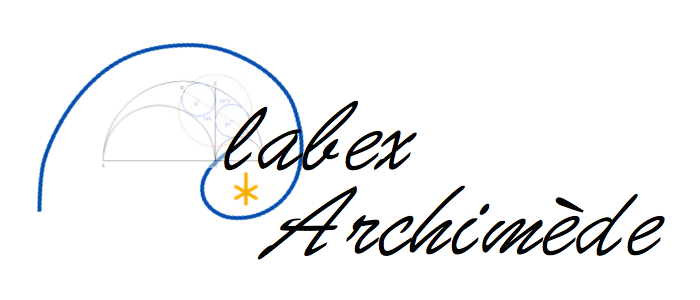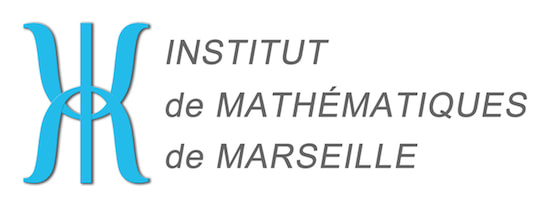Master Class Applied Mathematics CEPS
Masterclass Mathématiques appliquées CEPS
28 -30 May 2018
Comité de pilotage
Julia Charrrier (Aix-Marseille Université)
Maxime Hauray (Aix-Marseille Université)
Raphaèle Herbin (Aix-Marseille Université)
Erwan Hillion (Aix-Marseille Université)
Oleg Lepski (Aix-Marseille Université)
Contact : i2m-m2-ceps@univ-amu.fr
|
The Master Class Applied Mathematics CEPS is a three-day training course whose goal is to present the themes of the Master 2 Applied Mathematics CEPS in Marseille, namely scientific computing, partial differential equations, probabilities and statistics. An important place will be given to the decompartmentalisation between deterministic and random aspects on the one hand and theory, numerical methods and applications on the other hand. The annual theme of the Master 2 Applied Mathematics CEPS being : Mathematics of energy, the Master Class will be structured around applications to energy.
This training applies to all students interested in applied mathematics (students currently in Master 1 will be high-priority, but applications of students in Master 2 will also be considered). It aims at introducing research in applied mathematics to students, in a privileged environment which enables real interactions with the invited researchers (from universities, institutes and companies). This Master Class will consist of four mini-courses of three hours and three talks of one hour by researchers from institutes and companies, arround the theme of mathematics of energy.aster Class Mathématiques appliquées CEPS |
La Master Class Mathématiques appliquées CEPS est une formation de trois jours dont l’objectif est de présenter les thématiques du M2 Mathématiques appliquées CEPS de Marseille, à savoir le calcul scientifique, les équations aux dérivées partielles, les probabilités et la statistique. Une place importante est donnée au décloisonnement entre les aspects déterministes et aléatoires d’une part et la théorie, les méthodes numériques et les applications d’autre part. La thématique annuelle du M2 Mathématiques appliquées CEPS pour l’année 2018-2019 étant : Mathématiques de l’énergie, la Master Class s’articulera autour d’applications à l’énergie.
Cette formation s’adresse à tous les étudiants francophones intéressés par les mathématiques appliquées (en priorité les étudiants de M1 et prépa agreg, mais aussi les étudiants actuellement en M2). Elle a pour objectif de faire découvrir aux étudiants la recherche en mathématiques appliquées dans un environnement de travail privilégié permettant de réelles interactions avec les chercheurs invités (universitaires et chercheurs dans des instituts ou entreprises). Cette Master Class sera constituée de quatre mini-cours de 3h chacun et de trois exposés d’1h par des chercheurs dans des Instituts ou entreprises, autour des mathématique de l’énergie. |
Philippe Ghendrih (CEA IRFM)
Jean-Claude Latché (IRSN)
Jean-Marc Hérard (EDF)
Mini-courses
- Dominique Picard (Université Paris Diderot) Statistical methods applied to energy
Abstract : In this mini-course, we will illustrate how mathematics can be used to treat problems in the domain of energy. We will mostly focus on the following applications :
— the electricity consumption forecast,
— the forecast of the energy produces day-to-day by a wind farm
— the segmentation of a territory in homogeneous climatic zones.
We will see that in order to solve these problems, we need to use statistical and mathematical techniques and results, often sophisticated, coming from functional analysis, wavelet theory, Gaussian processes analysis or asymptotic behaviour of large random matrices…
- Clément Mouhot (University of Cambridge) Around the notion of entropy in PDEs and probability
Abstract : We will illustrate the importance of entropy, a physical concept introduced by Boltzmann, in mathematics, at the crossroads between probability and analysis.
- Robert Eymard (Université Paris-Est Marne-la-Vallée) Numerical Methods for fluid mechanics
Abstract : We will study some numerical methods for approximating Stokes and Navier-Stokes equations used to model viscous incompressible fluids. In particular we will highlight some links between the properties of the continuous model and the ones required to prove the convergence of numerical approximations. A few examples of classical methods will be developed more deeply.
- François Hamel (Aix-Marseille Université) Reaction-Diffusion equation for combustion models
Abstract : The aim of this mini-course is to present PDEs related to combustion models. The obtained equations admit particular solution of progressive front type that may describe flame propagation. Several methods of resolution of these equations will be mentioned.





